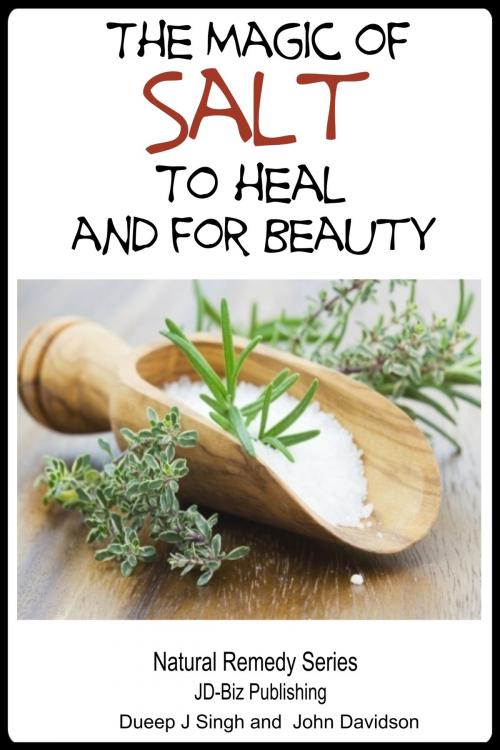The Magic of Salt To Heal and for Beauty
Nonfiction, Food & Drink, Herbs & Spices, Health & Well Being, Health, Alternative & Holistic Health, Herbal Medications| Author: | Dueep Jyot Singh, John Davidson | ISBN: | 9781311735249 |
| Publisher: | JD-Biz Corp Publishing | Publication: | February 27, 2014 |
| Imprint: | Smashwords Edition | Language: | English |
| Author: | Dueep Jyot Singh, John Davidson |
| ISBN: | 9781311735249 |
| Publisher: | JD-Biz Corp Publishing |
| Publication: | February 27, 2014 |
| Imprint: | Smashwords Edition |
| Language: | English |
The Magic of Salt To Heal and for Beauty
Table of Contents
Introduction
Production of salt
Differentiate between rock salt and black salt
How harmful is salt really?
Salt to heal common ailments
Buttermilk
Diarrhea
Recipe for Khichri – kedgeree
Flatulence
Headache
Dandruff Removal Oil
Taking Care of Tooth Trouble
Cold and Cough Remedy
Salt Fomentation
Bronchitis Relief
Arthritis relief
Traditional arthritis oil
Salt for Beauty
Sea Salt Scrub
Skin problems
Pimples and acne
Prickly heat
Skin Moisturizer for Itching
Eczema Cure
Fungal skin infection cure
Where Do You Buy Rock Salt/black salt?
Salt in Your Cuisine
Tips
Tasty Salt Spicy Mix
Appendix
How to make onion flakes
How to make ginger and garlic flakes
Desi ghee
Conclusion
Author Bio
Introduction
In this book of our Miracle Series, you are going to know more about the power of a very common ingredient, found in every one’s kitchen. This is salt, without which any salty dish is going to lose its savor and flavor.
Imagine food without salt!
Salt was held to be so precious in ancient times, that Roman soldiers were given salt daily at night, as salary. The idea was that they were going to have enough of salt in which they could cook their evening meal, with ground corn and onions. This was the diet on which the Roman legions marched and conquered half of the world. More than 3000 years ago, salt was used as a coin to ransom Kings and conquered prisoners, along with spices, which were considered to be more precious than precious stones and gold.
It is a historically known fact that Portuguese, German and British rulers of Africa asked the local chieftains to pay their taxes in ivory, local produce, and salt. That is the reason why, the idea of “he eats salt with his food,” was said to describe a rich man. Even as late as the 19th century, when the transport system had improved imports of salt to Africa, the fierce warriors in innermost Africa still demanded salt from and of their conquered prisoners. The average man did not have salt to eat, and that is why he flavored his food with aromatic leaves and other herbs gathered from the forests.
It is also a historical fact that the British tried out the same idea of taxation on salt in India, and that immediately brought the whole of India United up in arms, in their fight for independence. Salt was the birthright of every poor person in India, and putting the tax on salt was almost as much a tyranny, as putting tax on something like say, water or the air one breathed. The whole of India joined in the fight for independence, because they did not want rulers, who wanted to tax the salt they ate in their food. The quit India movement thus gained more popularity and impetus. And that is one of the factors which may be British decide to quit India in 1947.
Ancient medical treatises in Egypt and Persia considered salt to be necessary ingredient in making up nostrums and remedies to cure ills. Also, salt was used as a scrub, instead of soap or even sand, to remove dust and grime after a hard days work. In many religious ceremonies, salt was considered to be with the most pure of ingredients, and that is why it was offered to the gods.
If you go to Russia, you are going to be welcomed with the bread and salt. This has a historical significance. The idea of eating one’s salt, and being loyal to one’s salt has come down through millenniums, as the way in which feudal lords managed to keep the loyalty of the people under them. The one who had betrayed his own salt was a traitor to whom nobody would give any welcome.
The underlying significance was a soldier worked for a feudal lord. He was paid enough with which he could afford to buy precious salt for his food. Even today in the East, one takes the pinch of salt offered to him by a friend, or by an acquaintance, to acknowledge that his loyalty remains with the friend who has made him a brother of the salt.
The Magic of Salt To Heal and for Beauty
Table of Contents
Introduction
Production of salt
Differentiate between rock salt and black salt
How harmful is salt really?
Salt to heal common ailments
Buttermilk
Diarrhea
Recipe for Khichri – kedgeree
Flatulence
Headache
Dandruff Removal Oil
Taking Care of Tooth Trouble
Cold and Cough Remedy
Salt Fomentation
Bronchitis Relief
Arthritis relief
Traditional arthritis oil
Salt for Beauty
Sea Salt Scrub
Skin problems
Pimples and acne
Prickly heat
Skin Moisturizer for Itching
Eczema Cure
Fungal skin infection cure
Where Do You Buy Rock Salt/black salt?
Salt in Your Cuisine
Tips
Tasty Salt Spicy Mix
Appendix
How to make onion flakes
How to make ginger and garlic flakes
Desi ghee
Conclusion
Author Bio
Introduction
In this book of our Miracle Series, you are going to know more about the power of a very common ingredient, found in every one’s kitchen. This is salt, without which any salty dish is going to lose its savor and flavor.
Imagine food without salt!
Salt was held to be so precious in ancient times, that Roman soldiers were given salt daily at night, as salary. The idea was that they were going to have enough of salt in which they could cook their evening meal, with ground corn and onions. This was the diet on which the Roman legions marched and conquered half of the world. More than 3000 years ago, salt was used as a coin to ransom Kings and conquered prisoners, along with spices, which were considered to be more precious than precious stones and gold.
It is a historically known fact that Portuguese, German and British rulers of Africa asked the local chieftains to pay their taxes in ivory, local produce, and salt. That is the reason why, the idea of “he eats salt with his food,” was said to describe a rich man. Even as late as the 19th century, when the transport system had improved imports of salt to Africa, the fierce warriors in innermost Africa still demanded salt from and of their conquered prisoners. The average man did not have salt to eat, and that is why he flavored his food with aromatic leaves and other herbs gathered from the forests.
It is also a historical fact that the British tried out the same idea of taxation on salt in India, and that immediately brought the whole of India United up in arms, in their fight for independence. Salt was the birthright of every poor person in India, and putting the tax on salt was almost as much a tyranny, as putting tax on something like say, water or the air one breathed. The whole of India joined in the fight for independence, because they did not want rulers, who wanted to tax the salt they ate in their food. The quit India movement thus gained more popularity and impetus. And that is one of the factors which may be British decide to quit India in 1947.
Ancient medical treatises in Egypt and Persia considered salt to be necessary ingredient in making up nostrums and remedies to cure ills. Also, salt was used as a scrub, instead of soap or even sand, to remove dust and grime after a hard days work. In many religious ceremonies, salt was considered to be with the most pure of ingredients, and that is why it was offered to the gods.
If you go to Russia, you are going to be welcomed with the bread and salt. This has a historical significance. The idea of eating one’s salt, and being loyal to one’s salt has come down through millenniums, as the way in which feudal lords managed to keep the loyalty of the people under them. The one who had betrayed his own salt was a traitor to whom nobody would give any welcome.
The underlying significance was a soldier worked for a feudal lord. He was paid enough with which he could afford to buy precious salt for his food. Even today in the East, one takes the pinch of salt offered to him by a friend, or by an acquaintance, to acknowledge that his loyalty remains with the friend who has made him a brother of the salt.















